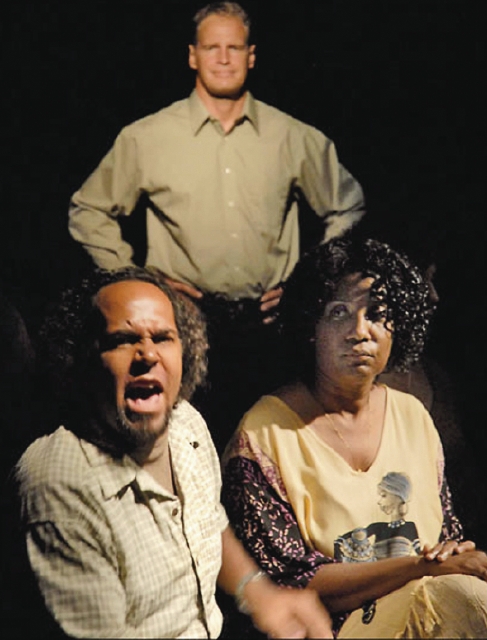The American public’s widespread support of the death penalty is a badge of shame for multiple reasons. One of the most poignant is the irrefutable fact that innocent people are all too often imprisoned—and in some cases even murdered—by the state.A few years ago, Jessica Blank and Erik Jensen interviewed dozens of people who were accused of crimes they didn’t commit and placed on death row. Luckily, they were exonerated years later after new evidence came to light. Blank and Jensen took several of these interviews, along with court transcripts, and compiled them into their award-winning play, The Exonerated , which is currently running at the Adobe Theater. Directed by Tish Miller, this production is hands-down one of the finest pieces of social theater I’ve ever seen in Albuquerque.Blank and Jensen braid these stories together in such a way that the viewer is forced to consider both the connections between each of the exonerated and their vast differences. During the intermission, my wife asked me if I thought anyone who saw this play could possibly still support the death penalty. The answer, of course, is yes. But why? How can we have such a cavalier attitude toward the destruction of innocent life? In other free, developed societies, the public takes it as a given that liberty and the death penalty can’t possibly coexist. Why are we different?This riddle is related, I think, to America’s sickening attitude toward collateral damage, that grisly euphemism for all the tens of thousands of innocent people we’ve murdered in Iraq and our other many wars. Why aren’t we more disturbed to discover we’re maiming and killing thousands of children who have nothing to do with terrorism or anti-Americanism? Of course, in American wars as in the American justice system, it’s almost always the poor and people of color who pay the stiffest price. How is this reality tenable for the United States of America, the self-proclaimed beacon of freedom and decency in the modern world?In this regard, The Exonerated asks more questions than it answers. This is a good thing. This play isn’t overtly political. Blank and Jensen merely place the facts in front of the audience in the interest of spurring much-needed debate.Thankfully, Miller’s cast is more than up to the task. Tribune columnist Gene Grant’s inexperience on stage shows in his portrayal of the thoughtful Delbert Tibbs, but this is actually beneficial. Grant wins us over with his confidence and conviction, and his raw edge works well in a play that avoids stereotypical theatricality, gaining all its true power from its directness. The best rapport in the show comes with the relationship between Robert Earl Hayes and his wife Georgia, played to fine effect by Darryl DeLoach and Gwendolyn B. Sedillo. Their quick wits and playful banter milk several laughs out of this highly serious show.Honestly, I’ve got to say that Alibi Circulation Director Thane Kenny, playing Kerry Max Cook, is light years ahead of the bumbling, amateurish performer I saw years ago in Sartre’s No Exit at the Vortex Theatre. In the intervening years, he’s really come into his own. Here, he concocts a deeply believable and moving portrait of Cook, a man wrongly convicted of rape and murder who spent a soul-crushing 22 years on death row.To drive the reality of this play home, the real-life Cook will be in town for this weekend’s performances. On Sunday evening, he will give a presentation in the Sandia Prep Auditorium at 7 p.m. The show is only running one more weekend, so make reservations to see it now.
The Exonerated runs Fridays and Saturdays at 8 p.m. and Sundays at 2 p.m. through Aug. 27 at the Adobe Theater (9813 Fourth Street NW). $12 general, $10 students/seniors. 898-9222.




